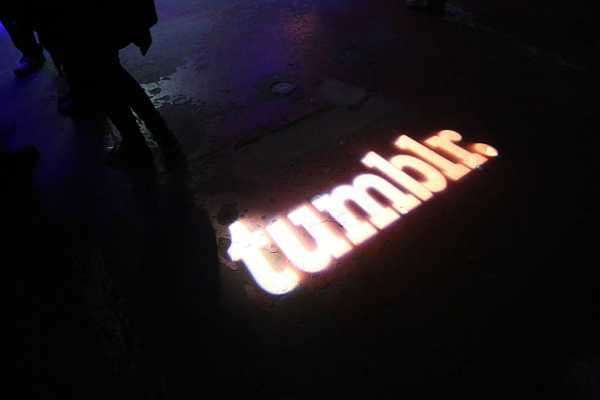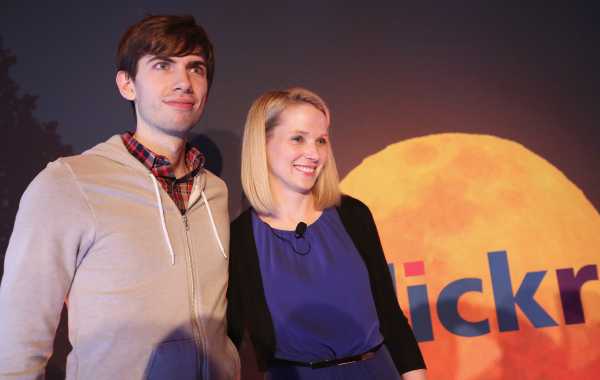

On Monday, Tumblr CEO Jeff D’Onofrio announced in a post on the staff blog that explicit visual content will be banned from the site starting on December 17. That means no more sex acts, no more nudity, and no more “female-presenting nipples,” whatever that means. The move comes after the Tumblr app was removed from the App Store in late November, due to the presence of child pornography on a number of private blogs.
D’Onofrio wrote that Tumblr recognized its importance as “a place to speak freely about topics like art, sex positivity, your sexuality and your personal journey” and promised that explicit text posts would not be affected, but continued: “Bottom line: There are no shortage of sites on the internet that feature adult content.”
The post further promised that users whose content would be affected by the change would “get a heads up from [Tumblr] in advance, and steps they can take to appeal or preserve their content outside the community if they so choose.”
Yet despite D’Onofrio’s assurances, the NSFW ban will directly affect artists, sex workers, and others who rely on the platform as a welcoming and inclusive space to discuss and depict diverse expressions of sexuality. It also speaks to Tumblr’s larger problems as a creative platform that could not have survived without founder David Karp selling it to a larger company, and has since been contorted and stifled by what it’s had to do to keep existing.
Why would Tumblr ban porn after 11 years of porn?
Tumblr, founded in 2007, was acquired by Yahoo in May 2013 for $1.1 billion despite sustained protest from its user base, including one petition with more than 170,000 signatures. Three years later, after it failed to reach advertising goals set by former Yahoo CEO Marissa Mayer, Yahoo wrote down $230 million of Tumblr’s value. The following quarter, citing projections for the company’s future possible ad revenue, they wrote it down again — this time by $482 million.
If Tumblr didn’t exactly blossom under Yahoo, it was at least left mostly alone. Then, in June 2017, Yahoo was acquired by Verizon for its ad business and merged into a punchline media company called Oath, smashed up against AOL — acquired in 2015, also for its ad business. Karp left the company in November 2017, and was replaced by D’Onofrio, then Tumblr’s COO and formerly an executive at post-Google-acquisition Zagat.

In February 2018, “Safe Mode” — a previously optional feature that filtered NSFW results out of Search and the Dashboard and launched in tandem with the Verizon acquisition of Yahoo — was turned on by default for all accounts. (It could still be manually switched off.)
Both D’Onofrio and Karp had been reporting to former Yahoo VP Simon Khalaf, who became head of media brands during the acquisition. It was Khalaf who — as I reported at The Verge last year — led a controversial all-hands meeting at Tumblr last May, saying that the question of whether Tumblr would continue to publicly support net neutrality protections (in direct opposition to the political leanings of its new corporate overlord) was a question “above his pay-grade.”
In the same meeting:
Khalaf left Oath in April, and his role has not been filled.
In November came the Tumblr app’s removal from the Apple Store. Speculation both inside and outside the platform’s community assumed this was the cause of the explicit content ban — a fear of being locked out of Apple’s precious walled garden, and an unwillingness to dedicate engineering resources to the task of creating a product that could adequately distinguish child pornography from other types of explicit content.
But a former staff engineer, who recently left Tumblr and asked to remain anonymous for professional reasons, tells Vox that the NSFW ban was “in the works for about six months as an official project,” adding that it was given additional resources and named “Project X” in September, shortly before it was announced to the rest of the company at an all-hands meeting. “[The NSFW ban] was going to happen anyway,” the former engineer told me. “Verizon pushed it out the door after the child pornography thing and made the deadline sooner,” but the real problem was always that Verizon couldn’t sell ads next to porn.
(Reached for comment on this timeline, an Oath representative pointed me to the phrase, “Over the past several months and inspired by our storied past, we’ve given serious thought to who we want to be our community moving forward,” from D’Onofrio’s blog post.)
Though the prevalence of porn on Tumblr has been somewhat overstated by people who don’t use it, it is a sizable piece of the platform’s content. Prior to the Verizon acquisition, a commonly cited study found that 22 percent of Tumblr users were consuming explicit content (though only 1 percent was producing it).
“Verizon pushed [the ban] out the door after the child pornography thing and made the deadline sooner”
Porn on Tumblr is something Verizon needs to wipe out if it’s going to make any money off what it thinks is actually valuable about the platform — enormous fandom and social justice communities that, just before the Verizon acquisition, Khalaf was insisting the staff figure out how to better monetize.
Tumblr currently has 10 million daily users, the former engineer says, and Verizon expressed a hope last summer that this number would “at least” double by the middle of 2019. (“I don’t remember the exact timeline … mostly because it was so ridiculous no one really paid too much attention to it.”) This is why the engineer quit, or as they put it, “jumped ship.”
The former employee also noted that Tumblr’s engineering team has been shrinking, with senior staff leaving for other jobs without hearing counteroffers from Verizon. Odd, because Tumblr would probably have an easier time growing if there were more investment in basic problems that a robust engineering team could address: The search feature is notoriously terrible, and the limited discovery features on the platform are virtually useless. Tumblr has struggled with porn bots and bad ads for years, but its tools for rooting them out are also widely considered to be far below the industry standard.

Verizon clearly needs Tumblr to be bigger, but there’s little evidence that its leadership understands own goals. Fandom communities, sex workers, researchers, and all kinds of Tumblr users who use the platform for a range of artistic or personal expression will find themselves restricted by the new rules — and many say it will force them to leave the platform. They’ll lose, and then Verizon will lose too.
A blanket ban on all explicit content robs sex workers of one of their last safe, useful spaces online
Tumblr has been a boon to sex workers because of its open-minded, densely connected communities, its non-public follower counts, and its guarantee of anonymity, and this ban is just one in a series of serious recent threats to their livelihood. This year also saw the popular classifieds site Backpage shutter its adult section, one of the results of the passage of FOSTA-SESTA — a controversial set of laws that purports to protect sex workers but dismantles the internet’s longstanding status as a safer place to advertise and conduct business. Tumblr had been one of the few remaining places where communicating about and around sex work was largely easy and low risk.
“I do a lot of advertising on Tumblr for my Patreon and nude work,” Stephanie Michelle, a cosplayer and YouTuber with more than 100,000 Tumblr followers, says. “So this will be a huge setback for me personally.”
Related
Why Tumblr’s adult content ban is about so much more than porn
She continues: “To alienate this loyal and vocal part of the site is shocking to me. Yet, on the other hand, when I read ‘female-presenting nipples’ I realized [Tumblr is] just another site that hates the female form. Is there any woman out here in 2018, sex worker or not, that’s surprised by the ability of a company to demonize a woman’s body? I don’t think so.”
A transgender Tumblr user and sex worker who wished to remain anonymous tells Vox, “Tumblr was a safe place to work for me because it allowed me to self manage. It’s actually more difficult that people think to get into sex work successfully online. Many cam sites are sketchy, will take the vast majority of your profits and make you sign over the rights to your content meaning they can repost it anywhere. [And] content like what I made/make is only really appealing to others in the LGBT community — I’m not wanted elsewhere and it’s hard for me to look at a profit anywhere else.”
This user says Tumblr’s structure allowed them to protect their identity, without a risk of friends or family stumbling across their work or of them being found in the real world by consumers of their videos. More importantly, it was a place for community.
“I could talk to other LGBT sex workers — there was a nice community on there that took care of each other,” says the sex worker. “Some of them have already lost their blogs. I have no other way of contacting them — I’ve lost some of my friends. I’m personally going to be losing a lot of security. I don’t know where is going to be safe for me to move to, I’ve been looking at my options.”
The decision ignores what was unique about porn on Tumblr — which wasn’t just a punchline
“I’m a trans girl, a lesbian, and I’m disabled — depression and anxiety — I can’t do traditional work,” Kay, a writer who’s trying to garner a larger following on the platform, says in an email. “Technically, I’m still allowed to write on the site, written erotica hasn’t been banned — but let’s be honest, I’m just looking at a slower death. After this clearing, no one’s going to be around who wants to see my stuff. They aren’t just getting rid of the artists — they’re driving off the fans, and potentially permanently altering what sort of users will be available.”
This includes Kate Hagen, a writer and community director at the independent screenwriting network the Black List, who says that she has used Tumblr as her exclusive source for porn, pointing out that much of it was made by women, most of them queer, and that “because of that, the content shared, while explicit in every conventional definition, feels so much more curated and ‘safer’ than what you might get by clicking a random tube site link. And the kind of porn that’s available on Tumblr is so much more diverse and inclusive.”
“Tumblr celebrated sexuality that was neglected or rejected by more mainstream sources of pornography.”
When Hagen discovered Tumblr, she says, it was the first time she had ever seen “fat people in porn experiencing real pleasure while being comfortable in their own skin,” rather than being treated as fetish objects. “Tumblr celebrated sexuality that was neglected or rejected by more mainstream sources of pornography — and it flourished there because the community was kind, inclusive, and supportive of all different kinds of folks and their interests.”
She also points out that many of Tumblr users are women, much or most of the explicit content on Tumblr “was made by, for, and about women,” and that Tumblr’s “all porn” reputation stems from the fact that “women were thrilled to finally find porn that fit their interests, and wanted to foster that community as much as possible.” The decision to squash all that, she says, is gendered, and a major loss.
“I’m just sad, plain and simple,” Stephanie Michelle says. “I built up relationships with my followers … I found artists and writers I fell in love with. Tumblr’s actions reinforce that sex workers and NSFW creators are bad and negative — that they simply shouldn’t exist.”
Tumblr’s mysterious NSFW-purging bots bring up important, internet-wide questions about fandom, creativity, and platform ownership
Several Tumblr users speaking to Vox for this story compared the NSFW purge on Tumblr to LiveJournal’s 2007 suspension of several hundred accounts that had expressed interest in topics like rape and incest. The suspensions came in two waves, called Strikethrough and Boldthrough (referring to the ways deleted accounts were demarcated on the blogging site), and wiped out entire communities — including the Harry Potter fanfiction subculture called “Pornish Pixies,” as well as rape survival groups.
These incidents, while perhaps less than memorable to the average internet user in 2018, were a watershed moment in the discussion of what it means to invest time and effort in a community-based creative platform. Who owns your work? Who will protect it? How do you even make the argument that what you’re making or who you are is important to anyone?
Internet archivist Jason Scott says that ripping NSFW content off of Tumblr is similar, except it’s cataclysmic in scale.
“Whenever you kill a URL, you kill everything that links to that URL and you kill any ability to reference it or use it in a cultural or historical sense,” Scott says. “Machines die, people die; a lot of that is unavoidable. But when it’s on purpose, it takes on more of an angering or saddening note. This didn’t have to happen.”
Scott says that while D’Onofrio’s blog post makes several mentions of the importance of Tumblr’s community, it’s clear to him that the company is “turning on” a group “they feel they can get rid of without feeling they’ve lost anything.” He continues, “You will never say to me that a phrase like ‘female-presenting nipples’ comes from a place of thought and consideration and working with your community.”
Carla, a Tumblr artist who takes commission for clean or explicit drawings of popular cartoon characters, says she wasn’t surprised by the blow. “We knew this website was poorly managed,” she writes. “There had been multiple times where users directly asked Staff what they were going to do about the influx of alt right users, pedophilic users, and inappropriate bots that would appear in tags that were meant to cater to underage users. There were so many times where Staff could’ve changed and actually listen to its user base but now it has to face an embarrassing end after a decade of influencing pop culture.”
“I’m losing a space where I could share my work without facing judgment from people I know in real life. I’m forced to start over from the beginning.”
Carla says she grew up on the platform and used it to discover herself as an artist and develop a following as a teenager. Now, as an adult, “I’m losing a space where I could share my work without facing judgment from people I know in real life. I’m forced to start over from the beginning. ”
Lacey, a fanfiction writer, says she’s already backed up her content, even though D’Onofrio’s post stated that explicit text will be permitted under the new rules. She’s got good reason to be paranoid; many Tumblr users are already watching their work disappear and having to fight for it in appeal, often saying they’ve received no explanation and can see no clear reasoning behind the platform’s decision. Though text is supposedly safe, Tumblr’s own text-only post about the changes was reportedly flagged by its porn-hunting bots.
Cliff Jerrison, who ran a sex and advice blog on Tumblr for several years and is still active on Twitter and Blogspot, says his account was removed over Thanksgiving weekend and that he wasn’t able to get Tumblr to provide a reason. He’s moved his work over to a private domain, saying he’s unwilling to trust another platform that might be friendly to sex writing now but could someday “have their own occasion to throw users under the bus.”
“A lot of Tumblr users were monetizing their work successfully, which is one of the reasons this is so devastating to the community,” he says. “People were making a living selling art commissions on Tumblr, being paid on Patreon for Tumblr posts, or using their Tumblrs to promote outside ventures like Etsy shops or cam sites, and they’re losing their sources of income right now.”
Tumblr is chasing away whole communities, and it looks like they have nowhere to go
If Verizon wants Tumblr to be a bucket of ads laser-targeted to the niche fandom communities it is constantly touting, it would look on paper as if this week’s announcement has brought that a step closer. But whose fandoms will it sell ads against once fans can no longer express themselves, due to takedowns that sometimes seem totally divorced from logic?
Jessica Bansbach, a blogger who collects Furbies (the popular toy from the ’90s, basically an animatronic owl with plastic, moving human eyeballs), has been part of a niche community of toy robot collectors for about a year and a half.
“Tumblr gives space for really strange, specific hobbies to originate or at least gain a larger audience, which is exactly what happened with Furbies,” she writes. “But with the new policy change, a lot of Furby blogs are randomly getting deleted, essentially destroying entire databases’ worth of furby-specific content (art, memes, lore, photographs, you name it). Nobody knows why since none of us post NSFW content — we think Tumblr’s ban bot is going out of control and randomly sniping us.”
She suspects that bloggers who have posted public statements distinguishing children’s toy fandom from pedophilia might be triggering the bots with the word, though she has no evidence, as she says no one has received any communication from Tumblr.
Whose fandoms will Verizon sell ads against once fans can no longer express themselves?
“So far, the new system has flagged completely innocent posts and is harming fandom creators as well as sex workers who use the site to advertise,” Lacey, the fan artist, says. “I’m personally angry about the flagging and banning of ‘female-presenting nipples’ because of the sexism and the negative effects that can have on members of the LGBTQ+ community. I would say an open and relatively accepting community is being lost.”
Where will that community go now? The problem is no one can decide. Twitter looks appealing for visual NSFW content, but it’s not well-suited for text. WordPress might be safe in some ways, but it has limited community and discovery features. Reddit has no reblogs. Instagram has even stricter content filters than Tumblr; the Tumblr user base is too young to remember or trust Newgrounds. Blogging platforms like the LiveJournal-based Dreamwidth or the Kickstarter-funded Pillowfort could be okay, but how do you make everyone move together?
Bansbach’s community is connected on the popular IRC chat site Discord — “a hub for displaced fandom members” — so they won’t lose each other. But they can’t decide where to go next, and she’s worried her group will splinter across Twitter, Instagram, and Reddit, with some going to Pillowfort and others not wanting to pay the registration fee. “I guess I don’t really have an answer,” she says.
For now, all anyone can do is mourn the ship while it sinks.
“Ultimately, there really is no other Tumblr,” Bansbach says. “There’s alternatives, sure. But nothing that offers what Tumblr gives.”
Sourse: vox.com






